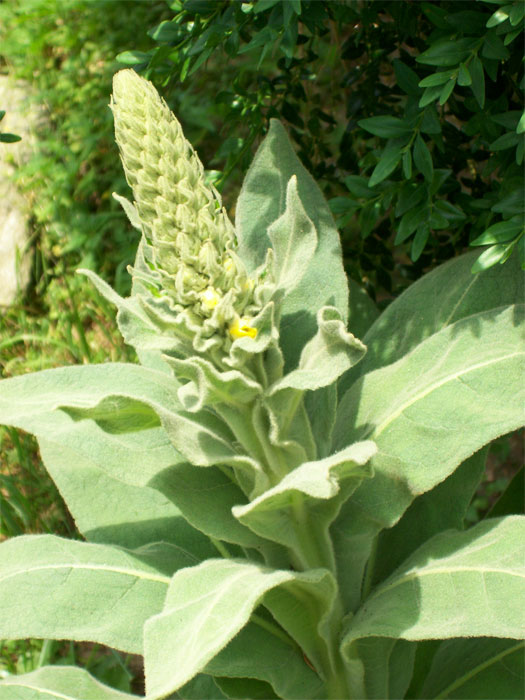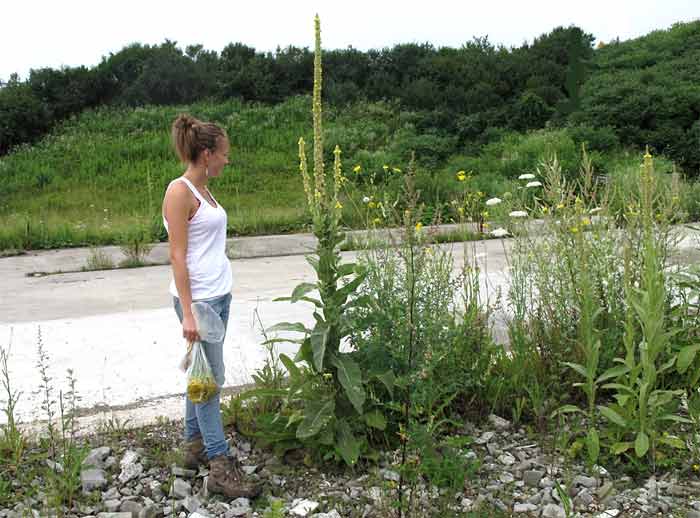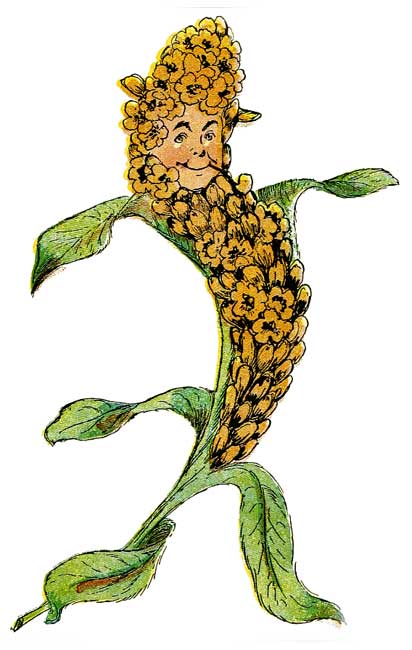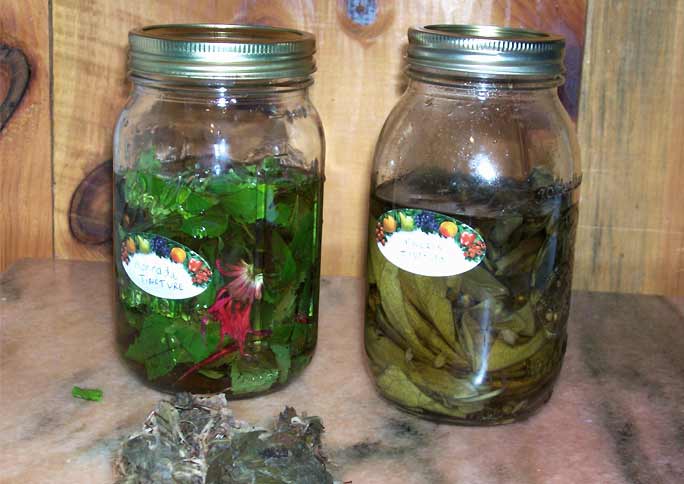Mullein in herbal medicine
Mullein (Verbascum) is one of the best know herbal remedies for lung problems, including congestion and infection. I am very thankful that it grows wild here on our farm.

Some people know mullein as Bunny's Ears, Velvet Dock, Aaron's Rod, Peter's Staff, or Flannel Leaf. The large, spongy leaves of mullein are covered in a fine down, like soft fur. The tall stems, topped with yellow blooms, are easy to spot in meadows and fields.
Mullein in herbal medicine and home remedies
Mullein is useful for treating bronchitis and other lung conditions. The leaves and flowers are used in herbal remedies to treat colds, flu, earaches, emphysema, and laryngitis. Mullein tinctures, teas, and syrups help bring up sticky phlegm. Mullein is used to fight bacteria and helps inhibit the spread of flu viruses.
Mullein is a lung tonic.
The mullein plant is well known for treating lung problems including bronchitis and asthma. Both the leaves and flowers contain mucilage, which coats and soothes mucus membranes in the sinuses, throat, and lungs.
Mullein also contains saponins which loosens phlegm and makes a cough more productive. Research has shown that mullein is anti-inflammatory and antiviral, making it an amazing herbal remedy.
Mullein is one of only a handful of herbs that can be smoked! When you start to get congested, reach for a pipe or rolling paper! Smoke a little bit of mullein, just a couple of puffs every few hours. It keeps phlegm from forming and painful, burning bronchitis at bay.

Mullein has many uses in herbal medicine.
The herb can be used in herbal teas, poultices, compresses, and tinctures to relieve scorpion stings, eye complaints, toothache, tonsillitis, and throat inflammation.
When infused in a good carrier oil like cold-pressed grape seed or almond oil, mullein flowers are good for soothing an earache.
When incorporated into an herbal salve, mullein is good for wounds, hemorrhoids, skin problems like eczema, and inflamed eyelids.
Mullein is also a good herb for treating digestive problems including irritable bowel syndrome.
Combine mullein with other herbs for extra strength.
Mullein is considered a mild sedative and an excellent herbal expectorant. In cases of chronic respiratory problems, mullein is good combined with mulberry bark, cowslip root, elecampane, sweet violet, anise, or thyme.
When using mullein to treat coughs due to colds, combine with horehound and lobelia.
Mullein is also good for treating burns because of its high mucilage content.
We sell a tea blend that contains mullein, plus we sell mullein seeds in our herb variety pack. See our store to purchase these herbal products.
Mullein makes a potent herbal tea.
- When using mullein in tea form, use one cup of water to a tablespoon of dried, crumbled leaf and/or flowers.
- Steep fifteen minutes and then strain through a fine cloth.
- Drink three to four cups per day. As with all herbs, many small doses throughout the day are best.
Mullein promotes sweating.
American Indians use mullein to promote sweating. This property can be utilized when treating feverish chills.
Mullein has a long history.
Greek physicians wrote about using mullein as an herbal medicine over two thousand years ago.
Ancient Romans used mullein as a hair rinse. The leaves were used on dark hair and the flowers on blonde hair.
The first English language herbals from the 1500's pointed to mullein as a TB remedy and praised mullein for its soothing and expectorant properties.
Culpeper advised mullein for treating persistent cough, tumors, and inflammations of the throat. Nicholas Culpeper, an herbalist from the 16th century, is the guy that brought herbalism to the masses. Much has been written about this courageous man. Here is a good article about Culpeper's life.

The future of mullein as a treatment for TB and lung diseases
Studies have shown that old time remedies such as using mullein for lung disease really works.
Published by the National Center for Biotechnology Information, an article by Eibhlín McCarthy and Jim M. O'Mahony says that the ancient claims about mullein are true. Mullein really is a good lung tonic!
After many studies, mullein is shown to fight harmful bacteria infection in the lungs and lymph nodes. This is no surprise to herbalists.
Mullein has many uses.
Mullein has strong anti-inflammatory properties that are useful in the treatment of respiratory diseases, circulatory problems, digestive issues, skin diseases, sense organ illnesses, and parasite infections.
Rubbing the hairy leaves on the legs increases circulation.
Mullein tea can help get rid of gallstones, diarrhea, and constipation due to regulating properties.
The tea is also useful for treating mouth sores and gum disease.
In cases of abdominal pain, a compress of mullein leaves should be placed on the stomach.
Mullein tea is an effective remedy for hoarseness, tonsillitis, and bronchitis. It can also be used in syrup form (which is good for children).
Mullein can be combined with mint, rosemary, mallow, hawthorn flower, coltsfoot, thyme, and pine for added strength.
Mullein compresses and poultices are also good when used in the treatment of rheumatism, arthritis, swelling, and broken bones. They are also used on rash, cysts, insect bites, nail infections, and shallow wounds.
Mullein's powerful terpenes and flavonoids are well documented and proven to interfere with the progression of many diseases.
Smoking mullein leaves
Many old timers smoked mullein as a remedy for asthma. Here on Payne Mountain Farms, we also prefer smoking mullein over drinking the tea.
At first sign of lung congestion, we put the dried leaves in a pipe or roll it up in a cigarette paper. Smoking mullein really works to bring up thick phlegm.
Other uses for mullein plants
Mullein leaves can be used to wrap apples to store for the winter. The dry leaves are used to start campfires since they made an excellent tender.
Mullein stalks were once used as tapers to light the way in funeral processions.
Mullen leaves also makes an acceptable toilet paper when they are fresh.

Mullein grew up rough-and-tumble.
He was Irish, very humble;
Still he was a jolly fellow,
With his funny head all yellow.
Mullein Plate No. 76, from Flower children - the little cousins of the field and garden provided by Wiki Media.
Mullein sends up a tall flower stalk in its second year.
Mullein grows wild in the North Georgia Mountains and throughout many other parts of the world. It is a bi-annual. Mullein likes rather dry soil and does not like to have wet feet.
Mullein blooms during the 2nd summer and can be spotted easily. A tall spike covered with little yellow blooms rises from a rosette of large, velvet-like leaves. It is not bright green but has a greenish-white hue.
Mullein can grow up to eight feet tall although usually reaches a height of about four feet.
Mullein plants are abundant some years and rare in others. I always try to gather seeds and scatter them along driveways, fence lines, and in meadows around the farm.
They grow in places where I least expect to see them. In the cracks of a cement walk, on a red clay bank, or in sandy sub-soil, you never know where you might find a healthy mullein plant.
When you do spot a mullein plant, there are usually others nearby. They grow in patches. Do not harvest all of them! Leave a few good plants to go to seed so that there will be a continuous supply from year to year.
Harvesting mullein for use in herbal medicine
Leaves and flowers should be collected in mid-summer. Do not harvest mullein plants that grow along busy highways or in areas that might have been sprayed with herbicide.
Mullein is often considered a weed. If you happen to have a wild mullein plant in your lawn, consider its value as a medicinal herb before killing it.
The tall plants are attractive in the back of a flower border.
Making mullein tincture
Tinctures are excellent ways to get the beneficial properties of herbs into the human body.
Home-made herbal tinctures are easy to prepare and can be done with ordinary kitchen equipment. All you need is the herbal plant material, a mason jar, and some vodka.
Mullein tincture
Mullein tincture is a tried and true remedy for colds, coughs, asthma, emphysema, and other lung conditions.

Directions for making mullein tincture:
- Harvest healthy mullein leaves (and flowers if plant is blooming).
- Tear them into pieces and put into a quart mason jar. Do not pack the pieces down - leave them loose.
- Next pour vodka over the plant material until completely covered (a few ounces of water may be added to dilute the alcohol).
- Keep the jar in a dark cabinet and gently shake EVERY DAY for 2 weeks.
- Keep the plant material pushed down into the liquid. (If you forget to shake it and mold appears, throw it all away and start over.)
- After two weeks have passed, strain the liquid into another quart jar removing old plant material.
- The herbal liquid will be brownish and fragrant with a medicinal aroma. Pour strained tincture into a bottle or clean jar, cap tightly, and store in a cool dark place.
Dried mullein can be substituted for fresh leaves if necessary. The tincture will still be a potent medicine.
Mullein tincture is good for winter lung conditions such as coughs due to colds and will keep up to two years in the refrigerator.
An average adult dose is one or two teaspoons 3 or 4 times a day with a double dose given at bedtime.
Vodka tinctures are not recommended for children due to their high alcohol content. For individuals with alcohol dependencies, other herbal remedies may be more suitable.
Herbal tinctures are used in the treatment of many health problems.
Known as tinctures or extracts, tinctures are one of the easiest ways to preserve summer herbs for winter use.
Mullein tincture and bee balm tincture may also be combined and sweetened with honey to make a soothing cough syrup. The mullein helps stop coughing and the bee balm relaxes the chest.
Take time to develop a relationship with medicinal herbs.
Whether preparing herbal lotions, herbal ointments, tinctures, or teas, take some time when using herbs. Inhale the scents and feel the textures of the plants. Treat medicinal herbs with respect. Find them in their natural habitat and watch the way they grow.
Notice that mullein leaves are thick and spongy like lung tissue, which gives us an indication of its purpose in herbal medicine.
Remember that medicinal herbs can be powerful, but may require many doses over a period of days for their beneficial properties to become apparent. Give them time to work!
Only try one new herb at a time to see how it reacts with your body. Use common sense and do some research before jumping into natural healing.
*Never take vodka tinctures when pregnant or if you are a recovering alcoholic. Do not use mullein infused oil in the ear if there is any chance of a perforated eardrum. Mullein seeds are toxic so never eat them or use them in tea.
Always consult a physician before using any herbal remedy especially if pregnant, nursing, or taking other medications.
Sources:
https://www.ncbi.nlm.nih.gov/pmc/articles/PMC2952292/
https://www.ncbi.nlm.nih.gov/pmc/articles/PMC8301161/
Blessings to you and yours!
Thanks so much for reading my blog. Jan.

*Note - the information on this website has not been evaluated by the Food and Drug Administration.
© 2005-2024 website design and content by Janice Boling